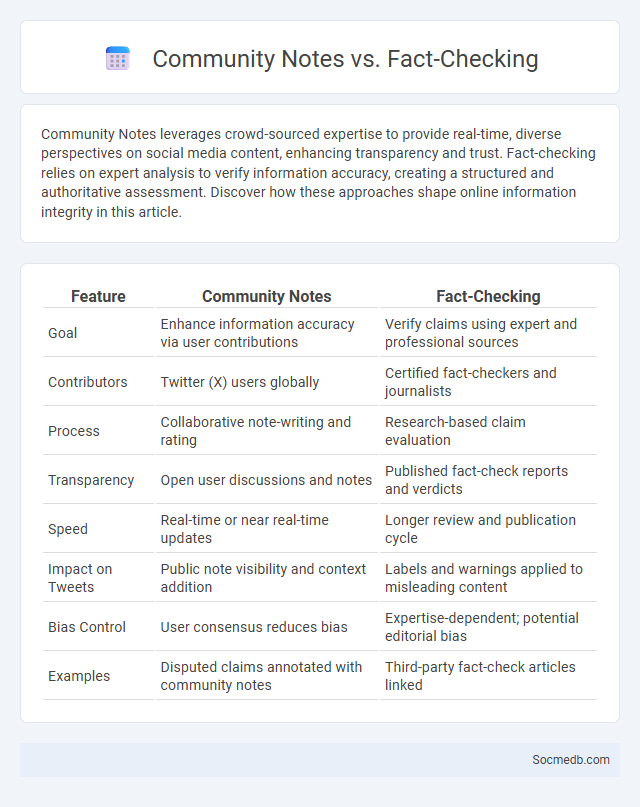
Photo illustration: Community Notes vs Fact-checking
Community Notes leverages crowd-sourced expertise to provide real-time, diverse perspectives on social media content, enhancing transparency and trust. Fact-checking relies on expert analysis to verify information accuracy, creating a structured and authoritative assessment. Discover how these approaches shape online information integrity in this article.
Table of Comparison
| Feature | Community Notes | Fact-Checking |
|---|---|---|
| Goal | Enhance information accuracy via user contributions | Verify claims using expert and professional sources |
| Contributors | Twitter (X) users globally | Certified fact-checkers and journalists |
| Process | Collaborative note-writing and rating | Research-based claim evaluation |
| Transparency | Open user discussions and notes | Published fact-check reports and verdicts |
| Speed | Real-time or near real-time updates | Longer review and publication cycle |
| Impact on Tweets | Public note visibility and context addition | Labels and warnings applied to misleading content |
| Bias Control | User consensus reduces bias | Expertise-dependent; potential editorial bias |
| Examples | Disputed claims annotated with community notes | Third-party fact-check articles linked |
Understanding Community Notes: Definition and Purpose
Community Notes are a collaborative fact-checking tool designed to provide context and accurate information on social media posts, enhancing content credibility. Users contribute by flagging misleading or false information, which is then reviewed and rated by the community to ensure reliability. This feature promotes transparency and helps combat misinformation across platforms like Twitter and Facebook.
What is Fact-Checking? Process and Principles
Fact-checking on social media involves verifying the accuracy of information before sharing or endorsing it, aiming to combat misinformation and maintain content credibility. The process includes identifying claims, consulting reliable sources, analyzing evidence, and providing clear verdicts on the veracity of the information. Core principles consist of impartiality, transparency in methodology, accountability for errors, and commitment to evidence-based conclusions to ensure trustworthiness.
Origins and Evolution of Community Notes
Community Notes originated in 2021 as a collaborative initiative by Twitter to combat misinformation through user-generated annotations. This feature evolved by leveraging collective intelligence, enabling diverse users to provide context and improve the accuracy of shared content. By participating, your contributions help create a more informed social media environment that prioritizes transparency and trust.
Key Differences Between Community Notes and Fact-Checking
Community Notes rely on crowd-sourced contributions from diverse users to add context and correct misinformation collaboratively, while traditional Fact-Checking involves experts or organizations assessing the veracity of claims through thorough investigations. Your interaction with Community Notes is more dynamic and participatory, allowing you to see multiple perspectives, whereas Fact-Checking delivers authoritative verdicts that often come after content has gone viral. The transparency and speed of Community Notes contrast with the detailed, slower, and centralized nature of Fact-Checking processes.
How Community Notes Work: Crowd-Sourced Verification
Community Notes utilize crowd-sourced verification by allowing diverse users to contribute context and fact-check information on social media posts. Contributors submit notes that provide additional insights or corrections, which are then rated by the community to determine their helpfulness and accuracy. This collaborative approach enhances content reliability by reducing misinformation through collective intelligence and transparency.
The Role of Experts in Traditional Fact-Checking
Experts in traditional fact-checking play a crucial role in combating misinformation on social media by verifying claims through rigorous analysis and evidence-based research. Their work involves cross-referencing sources, consulting primary data, and applying domain-specific knowledge to ensure accuracy and credibility. This methodical approach strengthens public trust in information and counters the rapid spread of false content on digital platforms.
Strengths of Community Notes: Speed and Inclusivity
Community Notes enhances social media reliability through rapid fact-checking that quickly addresses misinformation. Its inclusive approach invites diverse perspectives, ensuring a broader range of insights and improving content accuracy. By leveraging collective input, Your social media experience becomes more trustworthy and informed.
Limitations of Fact-Checking: Scalability and Bias
Fact-checking on social media struggles with scalability due to the immense volume of content generated every second, making real-time verification challenging. Algorithms and human reviewers often exhibit biases that affect the accuracy and fairness of fact-checking, potentially reinforcing existing prejudices. These limitations hinder the effectiveness of combating misinformation and require improved automated tools and diverse review teams for better results.
Impact on Misinformation: Community Notes vs Fact-Checking
Community Notes leverage crowdsourced insights to flag misleading content quickly, enhancing real-time misinformation detection on social media platforms like Twitter. Fact-checking organizations provide authoritative verification, but their slower pace limits immediate impact during fast-spreading viral events. Combining Community Notes' rapid, diverse input with professional fact-checking increases accuracy and trust in content moderation systems.
Future Trends: Collaborative Approaches in Combating Misinformation
Emerging social media platforms increasingly emphasize collaborative approaches to combating misinformation by integrating AI-driven fact-checking tools with real-time user reporting features. Partnerships among tech companies, governments, and independent fact-checkers enhance transparency and accuracy across digital networks. You can expect more interactive and community-driven efforts to verify content, fostering a trustworthy online environment.
 socmedb.com
socmedb.com